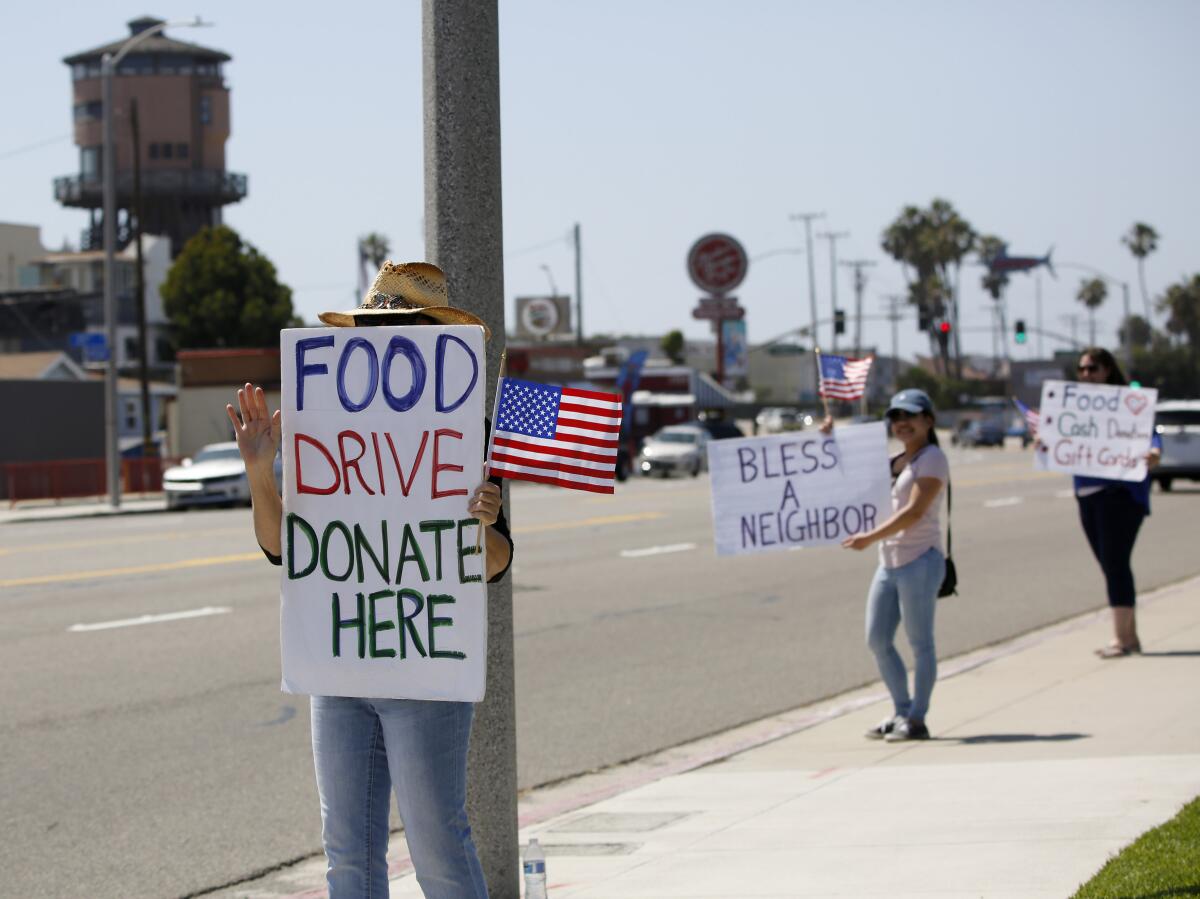Opinion: Giving Tuesday embodies a noble idea. Here’s how to make it meaningful to more of us

- Share via
Giving Tuesday’s arrival days after Thanksgiving and Black Friday snaps us out of the funk brought on by consumption of food and material goods at peak levels. It reminds us that we are more than just consumers.
Since Giving Tuesday was introduced in 2012, it has inspired more than $10 billion in donations. But giving is in trouble in other respects. Less than half of U.S. households make charitable contributions, down almost 20% from 2000. Total inflation-adjusted charitable giving was down more than 10% last year from the year before, and the share of personal income Americans give is at its lowest in nearly 30 years.
Inequality is endangering the reciprocity that Giving Tuesday celebrates. A recent Federal Reserve Board survey found that nearly 40% of American households can’t cover a $400 emergency, and almost 20% have $100 or less in savings. This is exacerbated by high inflation, a housing crisis and burdensome health and child care costs. Under such financial pressures, giving back is a strain even for the generous.
The number of Americans who give to charity has dropped every year except during the pandemic, and especially among young adults. Maybe it’s time to emphasize giving during Thanksgiving.
The historic gains made in the “Fight for $15” and other wage campaigns have given way to efforts to make $20 an hour the new minimum to keep up with the cost of living. If the federal minimum wage had kept pace with inflation and productivity since 1968, it would stand at nearly $21.50 an hour, about triple its current level.
A living wage is supposed to cover one’s basic costs — an important step that nevertheless limits our expectations to meeting workers’ needs but nothing more. We should set a standard that affirms true dignity and basic security for all workers by enabling them to participate in the charity that connects us to others and allows us to improve our communities.
A demand for not just a living wage but a “giving wage” would expand our vision of economic justice to include generosity — even if in small amounts. It would insist on the humanity of workers and the importance of enabling everyone to contribute to our public life.
Give to charities that maximize the impact of your donation, but don’t overlook causes close to your heart.
Franklin Delano Roosevelt argued for wages that would provide workers with “more than a bare subsistence level. I mean the wages of a decent living.” Our definition of decent living should include the ability to help people and causes that matter to us.
Rather than accepting poverty as a given, we should be elevating more people to a level of economic security that makes that possible. Amid the pressure to spend, and to work to earn money to spend, giving is a way of relating to money as full human beings with relationships and communities, passions and commitments.
Alexis de Tocqueville saw America’s voluntary associations as one of the most admirable elements of our democracy. “Nothing,” he wrote, “deserves more to attract our regard than the intellectual and moral associations of America.” He added that it’s “only by the reciprocal action of men upon one another” that “sentiments and ideas renew themselves, the heart is enlarged, and the human mind is developed.”
Giving Tuesday, as one of the movement’s leaders put it, promotes “generosity not as a benevolence that the haves show to the have-nots but rather an expression of mutuality, solidarity and reciprocity.” Breadth of participation transforms philanthropy from an elite activity to a collective, even democratic project in which everyone is a steward of the common good.
Giving back affirms us as citizens rather than the exhausted workforce or passive consumers of a society controlled by the wealthy. A giving wage would establish a threshold of true economic autonomy — of the capacity not just to survive but to “connect, serve and uplift one another.” We all have needs, and we all have gifts and talents to give. The trick is to honor both.
Everyone should be able to practice philanthropy because everyone’s humanity matters. Giving Tuesday invites us to imagine a new definition of decent living that includes the ability to give back.
Amy Schiller is a postdoctoral fellow at Dartmouth College and the author of the forthcoming “The Price of Humanity: How Philanthropy Went Wrong and How to Fix It.”
More to Read
A cure for the common opinion
Get thought-provoking perspectives with our weekly newsletter.
You may occasionally receive promotional content from the Los Angeles Times.










